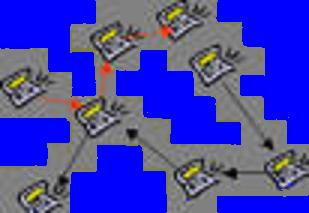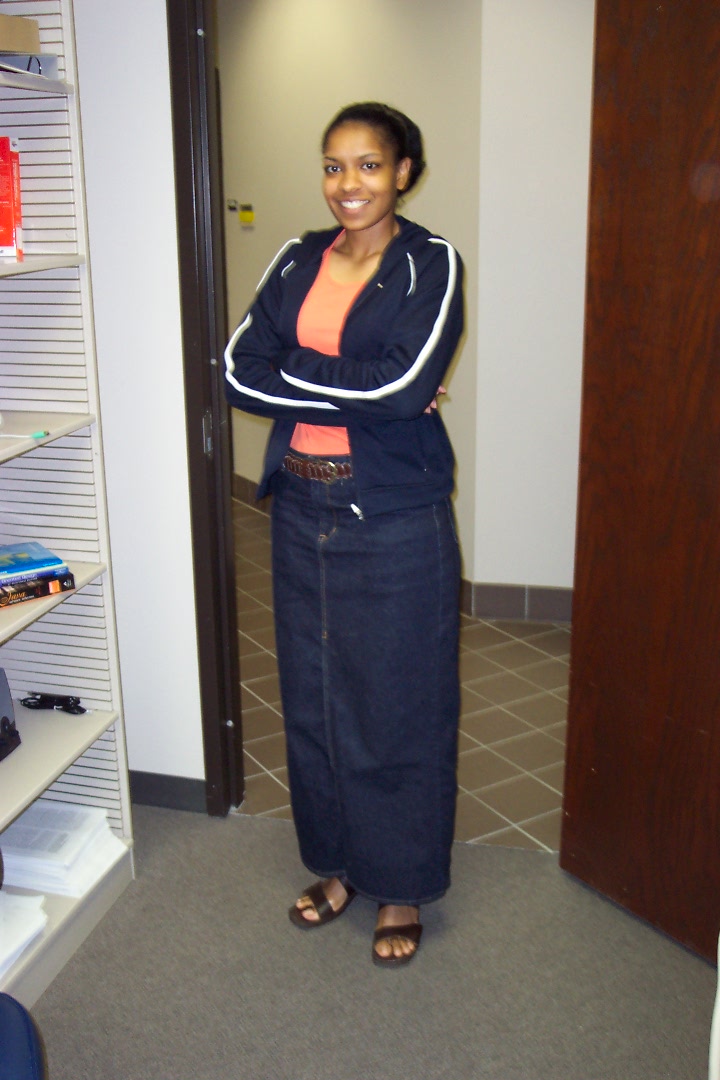Home Page
page1
page2

Table of Contents:
Background Info:
- I attend Wayne State University in Detroit, MI
- I'm a senior majoring in computer science
- My advisor/mentor is Prof.Jennifer Welch from Texas
A&M
University, Dept. of Computer Science
- Her research interests includes: Theory of Distributed Computing,
Algorithm Analysis, Distributed Systems, Mobile Ad Hoc Networks, and
Distributed Data Structures
return to
top
My current project centers around mobile ad hoc network( MANET ).
MANET is a collaborative group of mobile nodes forming a network which
incorporates wireless communication links between nodes. I will study
the renaming problem in MANETs. In the renaming problem, each node
begins
with a unique id drawn from a large space of possible ids and each node
must choose a new unique id drawn from a significantly smaller space of
ids. This problem has been studied extensively in traditional wired,
static networks (Attiya et al. 1990). On application in MANETS for
solutions to this problem, identified by Vaidya (2002), is the
automatic
dynamic assignment of IP addresses to nodes --- in a MANET it is not
usually feasible to rely on a central server to assist with this
process
and MAC addresses or serial numbers are too long for some routing
protocols to handle. Vaidya (2202) weakens the problem statement by
allowing the new ids (the IP addresses in his application) to not be
unique with some small probability; he then proposes a solution that
ensures that, even if duplicate addresses are chosen all packets sent
to
the same address will be delivered to the same node (which is one of
the
nodes with that address).
In addition to Vaidya's algorithm, I will study the more general
renaming algorithms of Attiya et al. in order to determine in what ways
they fail to work, or fail to work efficiently, in a MANET, and to
develop
modifications, as necessary, for the MANET environment. The TAMUSim
simulator (under development in Dr. Welch's research group) will be
used to automate these various algorithms. The TAMUSim simulator is
aimed at
helping people understand the behavior of MANET algorithms by providing
support for simulating example executions and possible
counter-examples.
As I explore the behavior of the renaming algorithms, I will look for
other improvements and/or variations on the algorithms and also
automate
them with TAMUSim, and compare them with the previous versions. The
ultimate goal of my research is to come up with efficent new algorithms
for doing renaming in MANETs; my summer work will be laying the
foundations for this larger term goal.
Hagit Attiya, Amotz Bar-Noy, Danny Dolev, David Peleg, and
Ruediger
Reischuk, "Renaming in an Asynchronous Environment,"
Journal of the ACM, vol. 37, no. 3, July 1990, pp. 524-528.
Nitin Vaidya, "Weak Duplicate Address Detection in Mobile Ad
Hoc Networks," Proceedings ACM MOBIHOC, 2002. pp.206-216.
Take a look at my
research presentation
return to
top
- week 1: My mentor, Prof. Welch picked me up from the airport
and gave me a little tour of the building I'll be working in. Wow! I said
to myself, this campus( Texas A&M ) is huge. I really enjoyed the campus
tour, so much information and history behind the school. My map and I
became extremely good friends...lol! After that I got settled into my
apartment for the summer. I mostly began my research by reading alot of papers
dealing with Mobile Ad Hoc Networks. There were so many things I
didn't understand, so I spent alot of time looking up terminology and
rereading the papers to get a better understanding of the material.
- week 2: There were three luncheon seminars this week and boy
was it delicious. Each research student received the chance to
introduce themselves by stating their name, what they were doing
research on and who they were working with. And of course, I read
more papers, repeating the whole cycle I began in week 1.
- week 3: All the research participants were required to
attend a hour long seminar( which basically explained the whole
research process, what it includes and what it does not. This
seminar is scheduled every week on Tues. and Thurs. The research
plan( ie. research goals and tasks to complete by a certain time)
is due this week, but our group is actually ahead of everyone else,
being that we turned in ours last week.
- week 4: Since we are using Java to program in I'm refreshing my
skills by going over necessary items in the language which will assist me
greatly when I began to program. Hopefully, we will start working with
the TAMUSim simulator, doing so will give me more insight on how the
algorithms I design work. This is probably the area I will definitely
need to spend some quality time in, because I'm no expert
when it comes to this. Really I don't consider myself much of a good
programme$I willing to learn. Trying to understand the code for the
TAMUSim simulator is truly a headache....there are so many .java files to search
through. In order to even attempt to implement my algorithm, I must first
understand the things I need to work with, change, or add to the TAMUSim
simulator....this part is tiresome and frustrating!
- week 5: Abstracts are due this week, but thank goodness I
finished mine last week. I wanted to get a head start, since I hate doing
things at the last minute...it causes too much stress! I've began to
write pseudo-code for the renaming algorithm, so things are beginning to
look good. Hopefully I'll be done in a few weeks. Well, I believe I have
come to the fun part...if I must say. I have begin coding the renaming
algorithm in Java, and things are starting to shape up. There are only a
few things I have to figure out in order to get the code working right.
- week 6: I'm beginning to make alot of progress in coding the
renaming algorithm, besides alot of debugging I have to work out, things
seem to be coming along good. I'm really desiring to be finished sometime
next week.
- week 7: The coding part of my research is more involved than
what I thought it would be. Debugging programs can be fun, but when you
don't know where the error is being generated from, things can start to
become frustrating, as it did in my case. Thank goodness I was able to
correct alot of the bugs with the help of the grad student I'm working
with.
- week 8: My program is finally up and running, the simulations
are so cool! The module I've coded simulates a "flooding" mechanism in
order to send a message to every node in the network. I've also begin
writing my final paper, which is due on the last day( Aug. 11th ).
Hopefully, I can get everything done that's left to complete and spend
some time to relax, shop, and enjoy the few weeks I have remaining.
- week 9: This week I'll probably be focused on completing my
final paper and also, I have to make a poster board that presents the
summer project I've done, which has to be done by Aug. 6th. For the next
two weeks, I'll be wrapping things up.
- week 10: Right now, I'm working on both my final paper and
poster. By this Friday, my poster has to be completed, since the
presentations are scheduled for that day. So, I'm juggling back and forth
between my poster and my paper. However, I'm so excited that I'm very
close to finishing both my paper and my poster. I just have a couple
things to add to it and they'll be completed. I recently found out
that I'm not required to do a poster, but I gonna do one anyway....I
think it'll be good experience. I'll be participating in a practice
poster session where I'll get to present my summer work and also, see the
work that other students have done.
return to top


